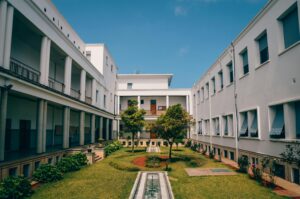Princeton University: A Tradition of Excellence and Intellectual Leadership
Introduction
Founded in 1746 in Princeton, New Jersey, Princeton University is renowned for its rich history, academic excellence, and commitment to research and teaching. As one of the oldest and most prestigious universities in the United States, Princeton has established itself as a center of intellectual inquiry, innovation, and global engagement. This article explores the history, academic programs, research endeavors, campus life, and impact of Princeton University.
Historical Background
Princeton University traces its origins to the College of New Jersey, established under the leadership of Presbyterian ministers to educate young men for religious service and civic leadership. Renamed Princeton University in 1896, the institution has evolved into a leading research university known for its liberal arts education and commitment to academic rigor.
Academic Excellence and Schools
Princeton University is organized into several academic divisions and professional schools that offer a wide range of undergraduate and graduate programs:
- Undergraduate Program (The College): Known for its liberal arts education, the undergraduate program emphasizes critical thinking, interdisciplinary study, and a commitment to service and leadership.
- Graduate School: Offers advanced degrees in humanities, social sciences, natural sciences, and engineering, preparing students for academic and professional careers.
- School of Engineering and Applied Science: Provides undergraduate and graduate programs in engineering disciplines, including civil, mechanical, electrical, and computer engineering.
- School of Public and International Affairs: Prepares students for careers in public policy, international relations, and global governance through rigorous academic programs and hands-on learning opportunities.
- School of Architecture: Offers programs in architecture, urban planning, and historic preservation, combining design education with interdisciplinary research.
Princeton’s academic programs are distinguished by small class sizes, close interaction with faculty, and a commitment to fostering intellectual curiosity and academic excellence among its students.
Research and Innovation
Princeton University is recognized for its pioneering research initiatives and contributions to knowledge across various disciplines.
Institute for Advanced Study
Located adjacent to the Princeton campus, the Institute for Advanced Study is an independent research center that has hosted some of the world’s leading scholars and scientists, including Albert Einstein. The institute’s collaborative environment fosters interdisciplinary research and intellectual exchange.
Princeton Plasma Physics Laboratory (PPPL)
The PPPL is a leading research facility focused on fusion energy and plasma physics. Collaborating with national and international partners, PPPL researchers work towards advancing clean and sustainable energy solutions.

Global Initiatives and Research Centers
Princeton University maintains a global presence through its research centers, initiatives, and partnerships with institutions worldwide. The Princeton Institute for International and Regional Studies (PIIRS) supports research on global issues, regional studies, and international affairs.
Campus Life and Community
Princeton University offers a vibrant campus life enriched by a range of academic, cultural, and extracurricular activities.
Residential College System
The university’s distinctive residential college system fosters a close-knit community where students live, learn, and engage with faculty and peers. Each residential college offers its own traditions, events, and opportunities for intellectual and social growth.
Student Organizations and Activities
Princeton students can participate in a variety of clubs, organizations, and student-run initiatives that cater to diverse interests, from academic and professional societies to cultural and recreational groups. These activities enhance students’ educational experience and contribute to a vibrant campus community.
Arts and Cultural Institutions
Princeton University is home to renowned arts and cultural institutions, including the Princeton University Art Museum and the Lewis Center for the Arts. These institutions provide opportunities for students, faculty, and the broader community to engage with visual and performing arts through exhibitions, performances, and educational programs.
Athletics and Recreation
Princeton University sponsors a comprehensive athletics program known as the Tigers, competing in NCAA Division I sports. Athletics at Princeton emphasize sportsmanship, teamwork, and a commitment to balanced student-athlete development.
Global Impact and Alumni Network
Princeton University’s influence extends beyond its campus, making significant contributions to scholarship, public policy, and global affairs.
Alumni Achievements
Princeton alumni include Nobel laureates, Pulitzer Prize winners, leaders in government and business, and influential figures in academia and the arts. Notable alumni include U.S. Presidents, Supreme Court justices, and leaders in fields ranging from literature to science and technology.
Philanthropy and Endowment
Philanthropic support plays a crucial role in advancing Princeton University’s mission of education, research, and community service.
Endowment and Financial Stability
Princeton’s substantial endowment provides essential financial resources to support scholarships, faculty research, campus facilities, and educational programs. Philanthropic gifts from alumni, donors, and supporters contribute to the university’s ability to maintain its commitment to academic excellence and innovation.
Diversity and Inclusion
Princeton University is committed to fostering a diverse and inclusive community where individuals from all backgrounds thrive and contribute to intellectual discourse and academic excellence.
Diversity Initiatives
The university actively promotes diversity through initiatives aimed at recruiting and supporting students, faculty, and staff from diverse racial, ethnic, socioeconomic, and cultural backgrounds. The Carl A. Fields Center for Equality and Cultural Understanding provides resources, programs, and support services to promote diversity and inclusion on campus.
Faculty Diversity and Support
Princeton University values faculty diversity and strives to recruit, retain, and support a diverse faculty committed to excellence in teaching, research, and service. The Office of the Dean of the Faculty supports initiatives to enhance faculty diversity and promote inclusive teaching practices across academic departments.
Global Engagement and International Collaboration
Princeton University maintains a global outlook through its international research collaborations, educational partnerships, and global initiatives.
International Research Collaborations
The university collaborates with institutions and researchers worldwide to address global challenges and advance knowledge in fields such as climate change, public health, and international development. Princeton’s research centers and institutes play a crucial role in facilitating international collaboration and interdisciplinary research.
Study Abroad and Global Education
Princeton offers study abroad programs and global education opportunities that enable students to engage with diverse cultures, languages, and academic perspectives. Through these programs, students gain global competence and contribute to cross-cultural understanding and cooperation.
Sustainability and Environmental Stewardship
Princeton University is committed to sustainability and environmental stewardship, integrating principles of sustainability into its operations, research, and educational programs.
Campus Sustainability Initiatives
The university implements sustainable practices in energy conservation, waste reduction, green building design, and campus operations. The Office of Sustainability collaborates with students, faculty, and staff to promote environmental awareness and implement sustainability initiatives across campus.
Research on Climate Change and Environmental Science
Princeton researchers are at the forefront of climate science, environmental policy, and sustainability research. The Princeton Environmental Institute (PEI) supports interdisciplinary research on environmental issues, addressing topics such as biodiversity conservation, renewable energy, and sustainable agriculture.
Philanthropy and Endowment
Philanthropic support plays a vital role in advancing Princeton University’s mission of education, research, and community service.
Endowment and Financial Support
Princeton’s substantial endowment provides critical financial resources to support scholarships, faculty research, campus infrastructure, and educational programs. Philanthropic gifts from alumni, donors, and supporters enhance the university’s ability to maintain its commitment to academic excellence and innovation.
Major Gifts and Campaigns
Princeton University has conducted successful fundraising campaigns to support its strategic priorities and institutional goals. Major gifts have funded endowed professorships, research centers, student scholarships, and capital projects that enhance teaching, research, and student life.

Conclusion
Princeton University stands as a pillar of academic excellence, intellectual leadership, and global engagement. With its distinguished faculty, rigorous academic programs, pioneering research initiatives, and vibrant campus community, Princeton continues to shape the future of knowledge and address complex global challenges. As it looks to the future, Princeton University remains dedicated to its core values of scholarship, service, and commitment to the public good, ensuring its continued leadership in higher education and beyond.

